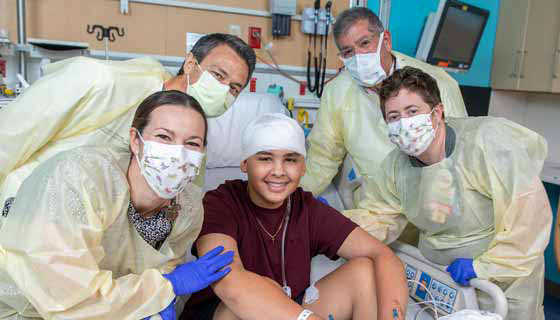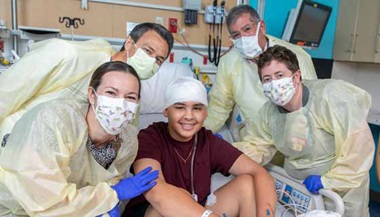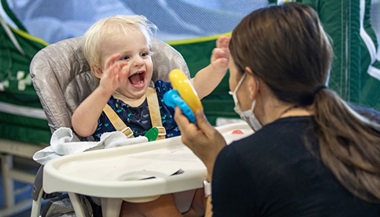Patient Story
Gunshot Wound: Bentley’s Story
“You were this close to heaven,” says his trauma surgeon while holding her hands narrowly apart at a reunion outside the Emergency Center. Two years prior, Raquel Gonzalez, M.D., was urgently packing his abdomen with gauze in an operating room slowing down liters of blood flowing from Charles Bentley’s belly. Gunshot wounds had severed his liver, injured his right kidney and caused so much blood loss that his heart stopped beating for 20 minutes.
Friends dropped 19-year-old Bentley at the front doors of the Emergency Center at Johns Hopkins All Children’s Hospital just before midnight. The Pediatric Trauma Center is certified by the Florida Department of Health and is specifically equipped to care for young patients who need comprehensive medical and surgical services. But there was no time to transfer him to an adult hospital. Moving him elsewhere would have been fatal.
“I will never forget Charles,” says Wassam Rahman, M.D., medical director of the Emergency Center. “It’s heartwarming to see he is doing so well. I took care of him after he was wheeled in from triage and despite his critical situation, he remained calm while telling us about himself. Everyone pulled together.”
Emergency medicine staffs use a trauma injury severity score (TRISS) to determine a patient’s probability of survival. Bentley’s score was 0.963 indicating he had a 3.7% chance of surviving. “When I saw Charles’ vital signs, I knew he was very near death,” Gonzalez says. “Seeing him today, without any neurological damage or permanent injury, it’s wonderful.”
She and nurse Katie Deemer are meeting with their former patient as they prepare to present his case at an annual conference for the Pediatric Trauma Society — a group of more than 1,000 medical professionals worldwide specializing in pediatric trauma. His case was one of only two selected for presentation to the global audience of lifesavers. Gonzalez and Deemer will share details of his case so that other trauma centers can learn from the processes in place at All Children’s and what his care team did to avert another fatality to gun violence.
“I rarely get to see patients after they’re better,” Deemer says. This is the first time she has seen Bentley since that stressful overnight shift when she rounded the corner of the hallway seeing a trail of blood connecting the lobby to the trauma room. She was at Bentley’s side in the EC and throughout his surgery with Gonzalez.
By the time the night was over, Bentley needed 20 liters of blood – four times his body’s capacity. “Between Charles and another emergency surgery happening that night, the blood bank was using taxis to bring us more blood products from nearby hospitals,” Deemer recalls.
Gonzalez and the surgical team operated on Bentley until just before sunrise. Severe hemorrhagic shock from his excessive blood loss was their first obstacle. Gonzalez packed his abdomen with bandages as the massive transfusion protocol was implemented to keep the donated blood from pouring out faster than it could enter his vital organs. He urgently needed his pulse restored before evaluation of his liver could begin. After four hours of surgery, Charles Bentley’s parents got the news they had been waiting to hear.
Bentley now works at Childs Park Recreation Center for the City of St. Petersburg. “I tell kids there, ‘Watch the company you keep.’ Don’t try to fit in. Be yourself.”
“If I ever hit the lottery, I’m going to take care of you Dr. G,” he says before waving goodbye at the very doors he entered that night two years ago. Deemer and Gonzalez returned to work.
Critical Care Medicine at Johns Hopkins All Children's Hospital




